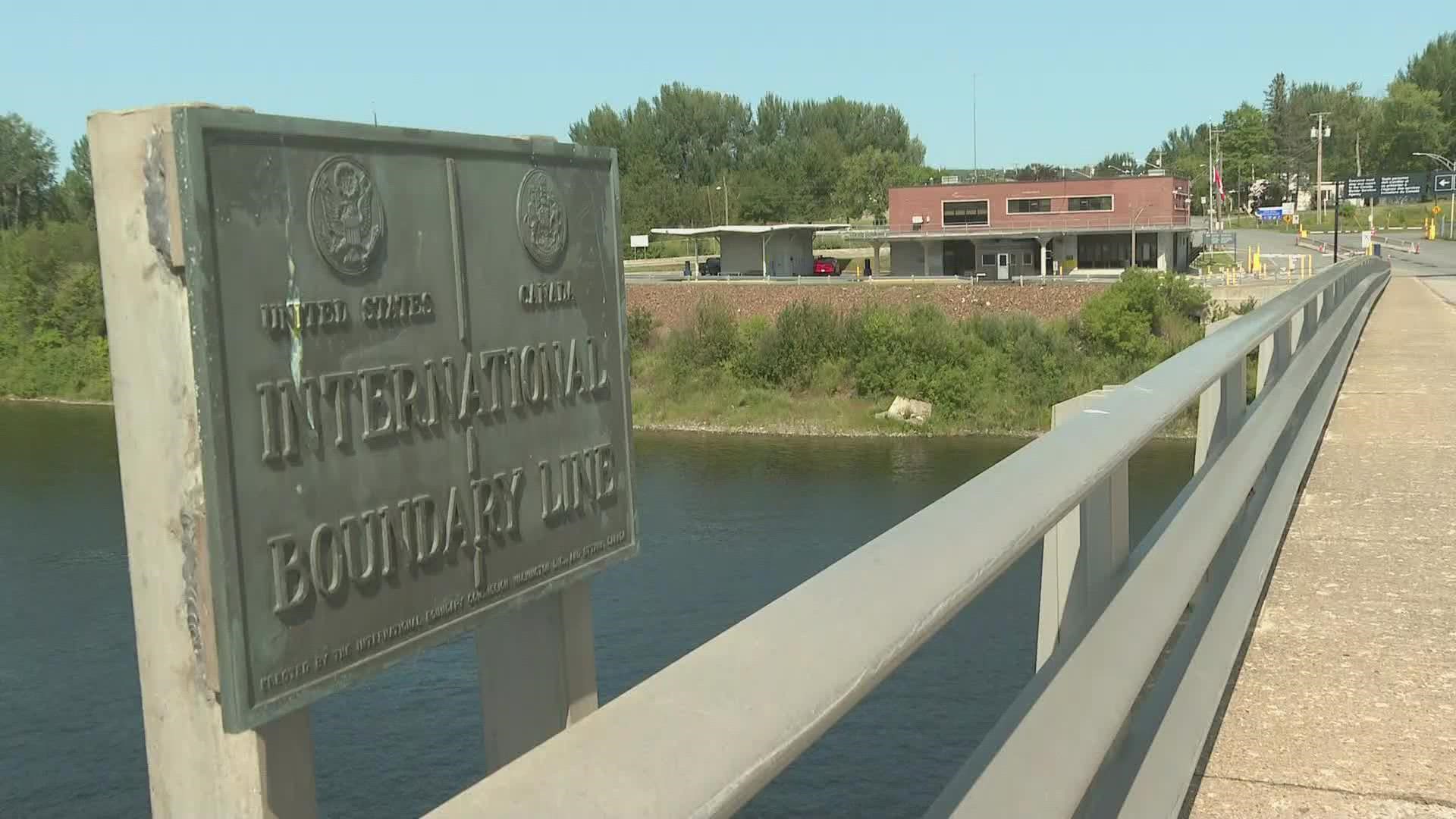VAN BUREN, Maine — After about 17 months of closure, the Canadian border opened up to visitors from the United States on Monday.
The border closed in March of last year due to the pandemic. Maine has 611 miles of border with Canada and 24 border crossings.
The border is open for American citizens to cross over into Canada, but Canadian citizens cannot yet cross over into the U.S. until August 21.
"Up in this neck of the woods we don't think of Canada as another country, we think of it as another community," said Mark Perreault, owner of Tulsa gas station and convenience store in Van Buren.
Much of his stores' traffic is from Canadian tourists who can practically see the place from across the border less than a mile away. His business has been down 30% to 35% because of the border closure.
Van Buren is one of many border towns in Maine. Travel restrictions and COVID regulations have drastically affected businesses here, Van Buren town manager Nancy Troeger said.
"Families who are separated, who are dual citizens, or have been married across for years," said Troeger. "Lots of people travel across daily for shopping both ways, for the family both ways so I think COVID shutting down the border was one of the most significant impacts."
PPP funding was able to sustain many small businesses up until now.
The owner of Saucier's IGA in Van Buren hopes his 15% business loss gets corrected soon.
If you plan on crossing the border into Canada you will need a few things:
- You have to be fully vaccinated (meaning two weeks after you got your final dose.) *Approved COVID-19 vaccines in Canada are Pfizer, Moderna, Astra Zeneca, and Johnson & Johnson.
- You need to submit some mandatory information through a Canadian border patrol app called ArriveCan.
- You have to live in the United States and travel to Canada from the United States.
- Be asymptomatic of all COVID symptoms.
- A negative COVID-19 test, even if you are fully vaccinated. It has to be a PCR test, rapid tests are not accepted by Canadian officials.
Verónic Horne is the chief of operation in the province of New Brunswick for the Canada border services. She said you'll also need to show proof of a specific COIVD test.
"They are also going to need a valid pre-arrival COIVD-19 molecular test. It has to be taken in the United States, prior to them crossing, and cannot be older than 72 hours. The antigen test commonly known as the rapid test is not a valid test for you to cross into Canada," Horne said.
Once you arrive in Canada, you might be required to take another COVID test. If that's the case, Horne said, Border Patrol Agency Services will pay for it.
If you are headed to a specific Canadian province, you should also check what is required for each province requirements vary.
"The two biggest issues we have found are individuals not imputting their information into the ArriveCAN application, and also providing us a antigen test which is a rapid test, as opposed to the PCR test which is the test that we are requiring," said Horne.
If you are a United States citizen and you successfully made it into Canada, United States border patrol agents say you only need your U.S. passport or driver's license to come in.
Don Snyder from New Hampshire had everything he needed except a PCR COVID test. He got one but it takes about two to four days for results to come back.
"The 72-hour test was tough because of the labs that you send it out to, it takes two to four days to get the stuff back in," Snyder said.
Snyder got the results back in three days and has all the other required documents. He rushed and successfully crossed the border to participate in an Atlantic salmon fishing event he has been part of for decades.
"There is no salmon fishing in the states that you can speak in, maine doesn't have it and new hampshire surely doesn't either, so you gotta go into Canada," said Snyder.
At the Aroostook Hospitality Inn in Van Buren, Ray from Kentucky is spending a night or two also waiting on PCR COVID-19 test results.
"My intention was to get a rapid test when we got here because coming from kentucky it took us five days, so obviously the 72 hours would have been up had we done it at home," said Ray.
"We have lots of festivals taking place throughout the month of september, so it's harvest season here, so they can take part in harvest festivals, music festivals, culture, festivals, lots to see and do. We do expect late august and all through september into october to be very busy," said Kelley Keefe, program manager for the Atlantic Canada Agreement on Tourism.
Keefe said it is peak tourism season and Canadians are ready to greet you.
Tourism is what's driving Ray and his wife to visit Canada.
"We are trying to drive around the Quebec Peninsula, we haven't been to quebec before, we heard it's an amazing drive," Ray said.
"I haven't gotten a salmon yet but certainly was worth coming up here I got to tell you," Snyder said.

